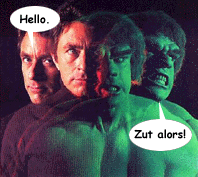Get a load of this: Bruce
Banner was standing at a set of traffic lights next to
this woman, and he suddenly got really angry, and turned
into The Incredible Hulk, and his trousers burst open,
and the woman freaked out and ran across the road and
got hit by a bus and was instantly killed. The moral of
this tragic tale is: "Don’t cross when the green
man flashes, no matter what you’ve been taught by road
safety advisors". It’s a sad, true story, and was
related to us by one Uncle Ricky Dinkle, a childrens’
entertainer at a holiday camp in Dimchurch, wherever
that is. Actually, it probably isn’t a true story now
that we think about it, but when we were nine it caused
us to have a nightmare wherein The Hulk chased us with
his revolting floppy green cock slapping against his
thigh. We still suffer the occasional flashback wherein
his emerald pubes bear down on us...

Of course, The Incredible
Hulk was originally the creation of Marvel Comics’
Stan Lee and Jack Kirby, but it is the character’s
television incarnation which concerns us today. Debuting
on US TV back in late 1970s and early 80s, The
Incredible Hulk starred Bill Bixby as the newly-named
"David" Banner (network executives felt the
name Bruce to be too closely associated to those evil
homosexuals), and floppy-titted body builder Lou
Ferringo as his green-hued alter-ego. The show differed
from the comic in several respects. Firstly, The Hulk
was somewhat weaker than his paper-based counterpart.
Whereas the Marvel character was capable of lifting
mountains, the Ferringo Hulk could just about lift the
tail end of a VW Beetle off the ground. Also, whereas
Bruce Banner gained his unwanted ability to turn into
the monster when angered, via a gamma bomb explosion,
David Banner’s powers came about as a result of an
accident during experiments into human feats of physical
prowess.
In the comic The Hulk was
pursued by General "Thunderbolt" Ross, and his
Hulkbuster team. In the TV series The Hulk was pursued
by hack reporter Mr McGee. The TV series dealt with
burning issues of the day, such as child abuse, and
mental illness. The comic dealt with such burning issues
as "Who is stronger: The Hulk or The Thing?"
Two considerations lead
to this peculiar approach: ratings and budget. The
show’s producer Kenneth Johnson, acting upon orders
from CBS, kept Banner’s transformations to a maximum
of two per show, while attempts to appeal to adults as
well as kids, resulted in a relatively low-action,
plot-driven format.
Each week, David Banner
would wander from town to town, finding himself in a new
job (most usually as a caretaker), under an assumed name
("Bruce Danner", "Bryce Banno",
"Druce Tanner" etc.). He would then get beaten
up by local thugs after sticking his nose where it
wasn’t wanted, his drubbing resulting into his
anger-induced transformation into The Hulk. His clothes
would fall off, he’d steal some more from a washing
line (though, because he was a good man, he’d peg some
money to the line), and he’d move onto the next town,
having inadvertenly sorted out some local problem by
having The Hulk kick the crap out of the toughs.
"Life sucks, but violence solves everything, and
always make sure you pay for your stolen clothes"
was the lesson learned from The Incredible Hulk, and to
drive the point home the show’s end title music was a
mournful piano refrain which dared you not to burst into
tears.
The show lasted a
respectable four and a half seasons, but returned in the
late 1980s during the US networks’ remake boom (which
also saw a well-fed Lee Majors dragged out of Burger
King for a couple of Six Million Dollar Man movies). The
three Hulk TV movies - The Return, Trial and Death Of
The Incredible Hulk - toyed with the format established
by the series, introducing other Marvel Comics
characters as test beds for possible spin-offs. The
higher action and humour levels effectively condemned
the show: The Incredible Hulk had burst through his last
wall. Within a couple of years, Bill Bixby was as dead
as his alter-ego, ending the last hope of it ever
returning. Unless the proposed motion picture gets the
go-ahead, of course.
While probably the most
grown-up and mature of any comic book-to-TV make-over,
The Incredible Hulk was, nevertheless, mind-numbingly
tedious. You’d find yourself sitting through forty
minutes of Bill Bixby’s houlier-than-thou moralising
and angst, before you caught your first glance of his
swollen, jade other half. Even then, The Hulk’s
appearance was usually a disappointment: he’d chuck a
couple of cowboys into a bush, before knocking over a
table or two, and then turn back into Banner. Why
couldn’t he have a fight with a load of monsters, or
punch a tractor into outer space, or something?
We’re glad it was axed.
Stupid programme.
